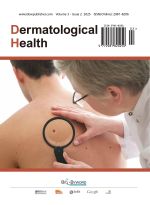Abstract
Objective: This study aims to verify the reliability and validity of the Chinese version of the Psychosocial Adaptation Questionnaire (PSAQ-CSD) in patients with chronic urticaria (CU), to assess their psychosocial adaptation levels. Methods: The study involved 102 confirmed cases of chronic urticaria. The PSAQ-CSD was translated and culturally adapted for Chinese use, followed by a pre-survey validation. Exploratory factor analysis and Cronbach’s α coefficient were used to test the construct validity, internal consistency reliability, and criterion-related validity of the scale. Results: The Cronbach’s α coefficient for the Chinese version of the PSAQ-CSD was 0.930, indicating good internal consistency. Exploratory factor analysis showed a KMO value of 0.848 and a cumulative variance contribution rate of 65.142%, consistent with the original scale structure. Criterion-related validity analysis revealed strong correlations between the PSAQ-CSD and the CU-Q2oL scale in emotional, self-cognitive, and social dimensions. All correlations were statistically significant, P < 0.05. Conclusion: The Chinese version of the PSAQ-CSD demonstrates good reliability and validity in patients with chronic urticaria, making it an effective tool for assessing psychosocial adaptation. It can comprehensively reflect patients’ emotional states, self-cognition, and social adaptation, providing a theoretical basis for clinical intervention and psychological support. Future research should expand the sample size and consider more cultural and social factors to enhance the application range and accuracy of the scale.
References
Liu K, Zhang S, Wang R, et al., 2024, Research Progress on Psychosomatic Intervention of Chronic Urticaria. Journal of PLA Medical College, 45(09): 996–999 + 1005.
Finlay AY, Khan GK, 1994, Dermatology Life Quality Index (DLQI)—A Simple Practical Measure for Routine Clinical Use. Clinical and Experimental Dermatology, 19(3): 210–216.
Baiardini I, Pasquali M, Braido F, et al., 2005, A New Tool to Evaluate the Impact of Chronic Urticaria on Quality of Life: Chronic Urticaria Quality of Life Questionnaire (CU‐Q2oL). Allergy, 60(8): 1073–1078.
Zhang X, Xu H, Wang A, 2021, Development and Evaluation of the Psychosocial Adaptation Questionnaire Among Patients with Chronic Skin Disease. Dermatology, 237(4): 641–648.
Wang X, Xia H, 2016, Construction and Application of a New Translation Model Based on the Classic Brislin Back-Translation Model. Journal of Nursing, 31(07): 61–63.
Wang X, Zhao T, Zhang X, 2004, Preliminary Study on Reliability and Validity of Quality of Life Indicators for Skin Diseases in Simplified Chinese. Chinese Journal of Epidemiology, (09): 63–65.
Yu M, Chen Y, Liu B, et al., 2020, Validation of the Chinese Version of Chronic Urticaria Quality of Life Questionnaire (CU-Q2oL). Chinese Journal of Dermatology, 53(12): 6.
Wu M, 2010, Practical Statistical Analysis of Questionnaire: SPSS Operation and Application, Chongqing University Press, Chongqing.
Schreiber JB, 2021, Issues and Recommendations for Exploratory Factor Analysis and Principal Component Analysis. Research in Social and Administrative Pharmacy, 17(5): 1004–1011.
Wang W, Wang S, Sun Q, et al., 2024, Translation and Psychometric Validation of the Patient Participation Culture Tool for Healthcare Workers in Chinese Nursing Context. BMC Nursing, 23(1): 565.
Zhu H, Pang Y, Li F, et al., 2020, Assessment of Quality of Life and Influencing Factors in Patients with Chronic Urticaria. Chinese Journal of Integrated Traditional and Western Medicine in Dermatology, 19(06): 536–539.
